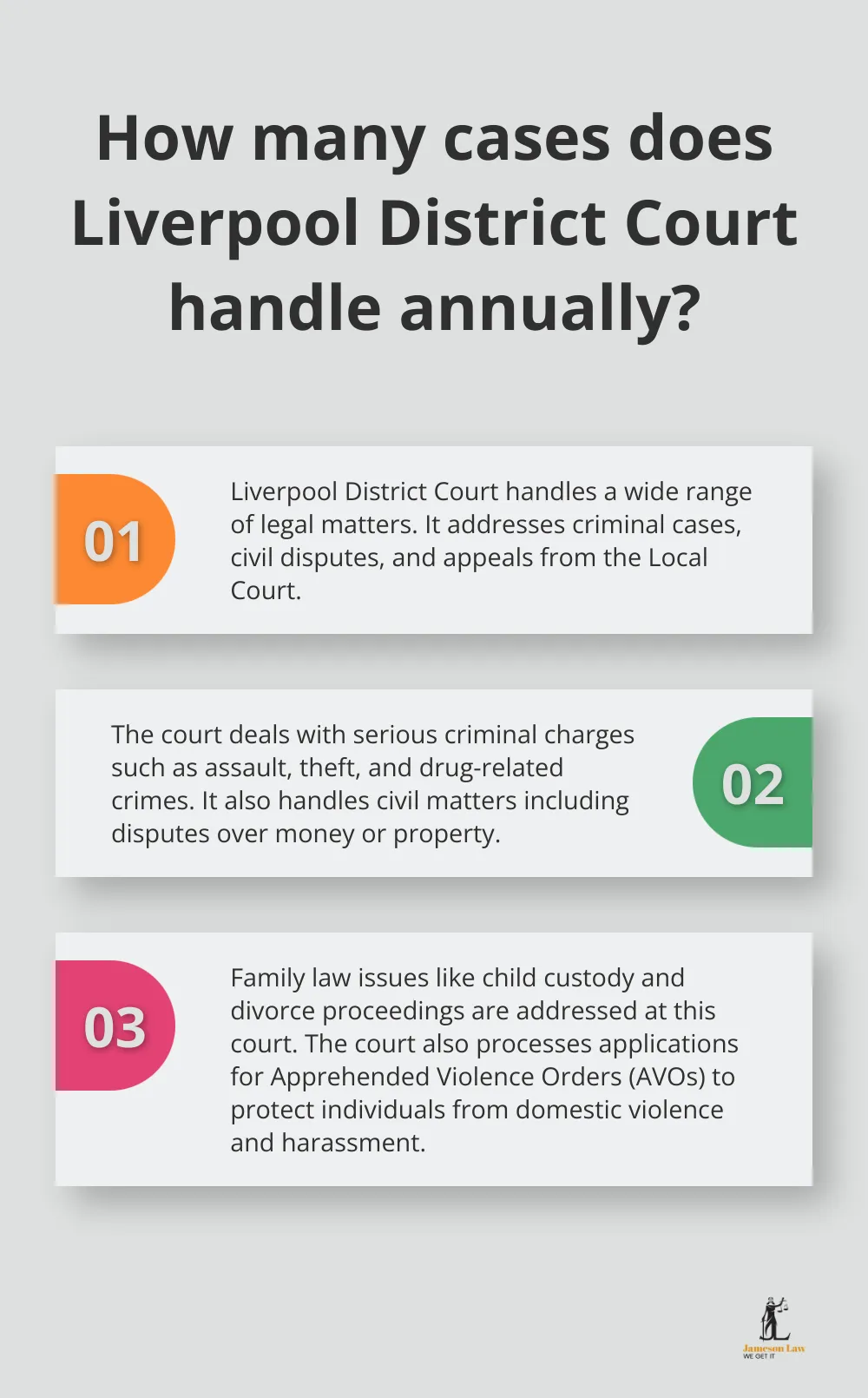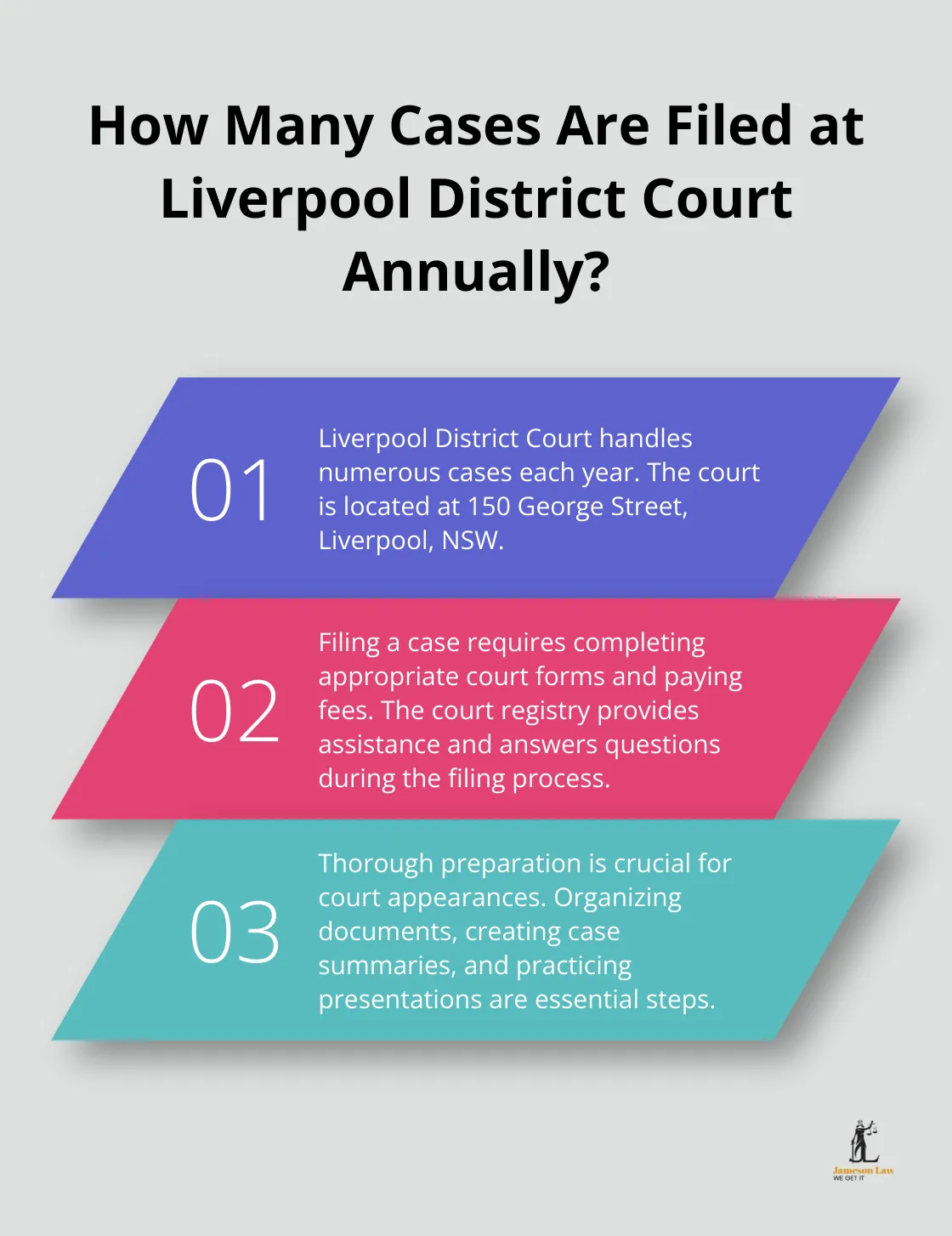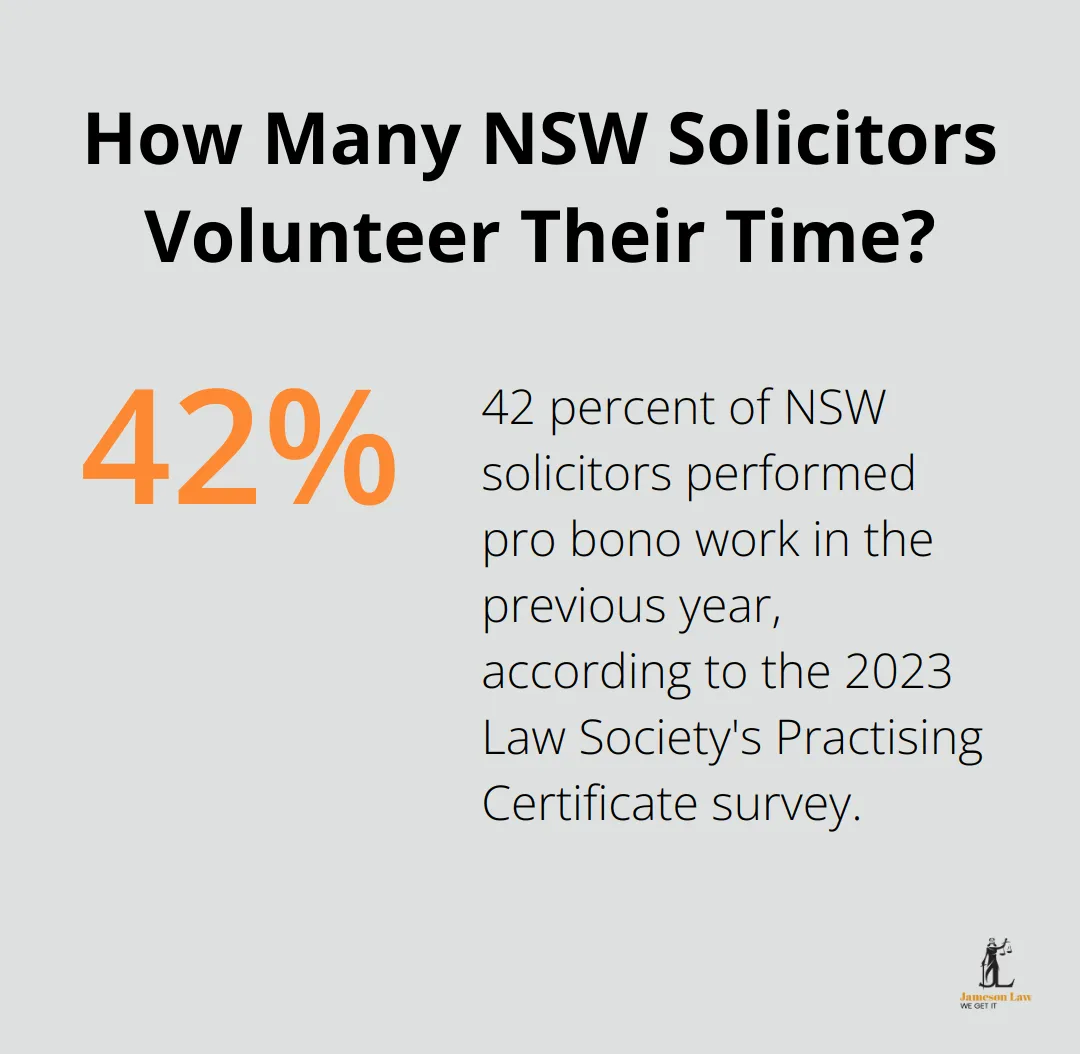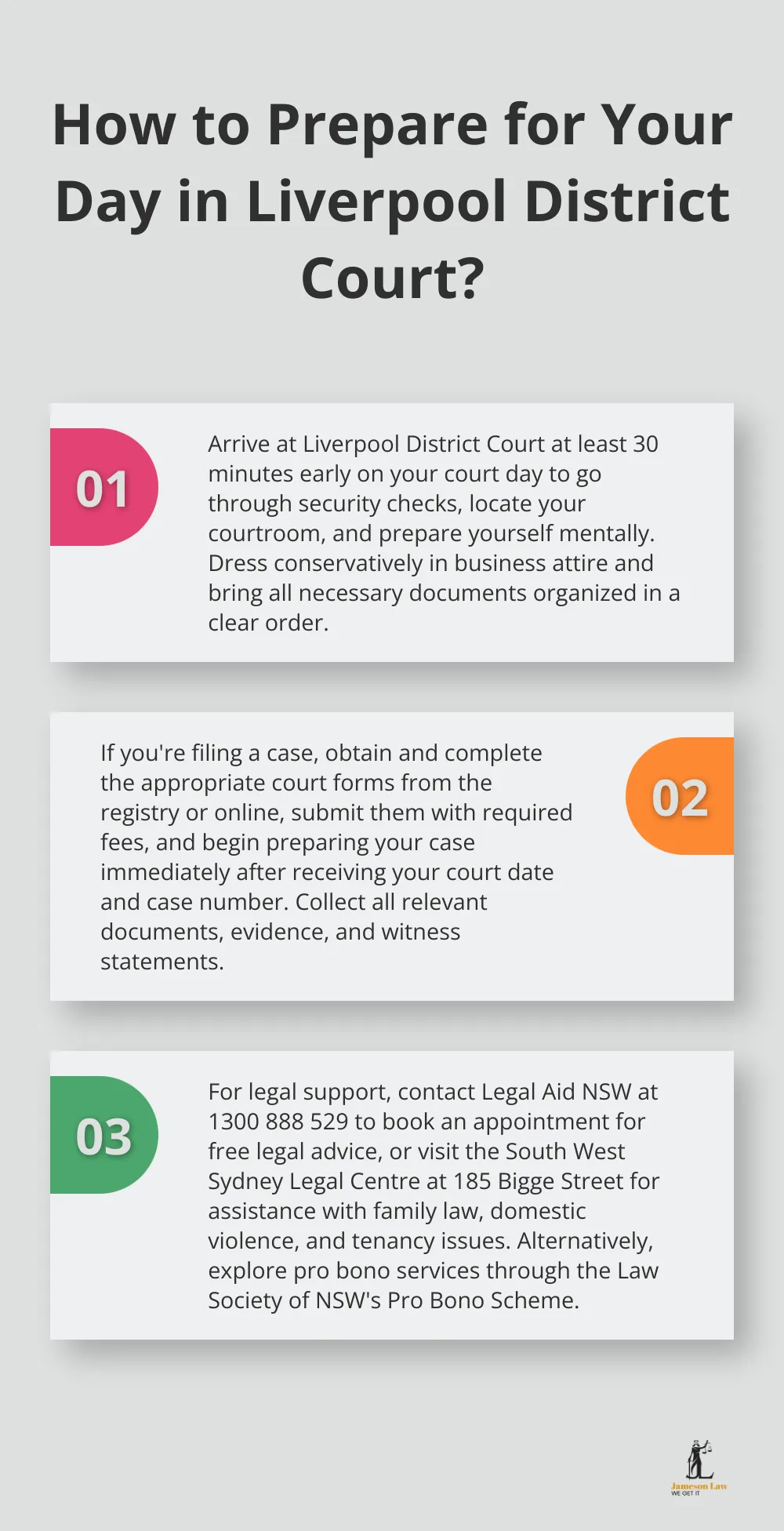Navigating the legal system can be daunting, especially when facing a court appearance. At Jameson Law, we understand the challenges you might encounter at Liverpool District Court.
This comprehensive guide will walk you through the court’s jurisdiction, processes, and available resources. Whether you’re filing a case or preparing for a hearing, we’ve got you covered with practical advice and essential information.
What Happens at Liverpool District Court?
Types of Cases Heard
Liverpool District Court handles a wide range of legal matters. As part of the New South Wales court system, it handles serious criminal cases, civil disputes, and appeals from the Local Court. Criminal cases often involve charges such as assault, theft, and drug-related crimes. Civil matters typically include disputes over money or property, while family law issues like child custody and divorce proceedings are also addressed here.

The court also deals with applications for Apprehended Violence Orders (AVOs), which protect individuals from domestic violence and other forms of harassment. The court also addresses apprehended violence order (AVO) applications and may order dispute resolution in care and protection cases.
Key Court Personnel
When you attend Liverpool District Court, you’ll encounter various court officials who play important roles in the legal process. The judge (also referred to as “Your Honour”) presides over cases and makes final decisions. Court officers maintain order and assist with courtroom procedures.
The court registry staff are essential for administrative tasks, including filing documents and providing information about court processes. They’re available during court hours to answer questions and guide you through procedural matters.
Preparing for Your Court Appearance
If you’re scheduled to appear at Liverpool District Court, preparation is key. You should arrive at least 30 minutes before your scheduled time to go through security checks and locate your courtroom. Dress conservatively and professionally – suits for men and business attire for women are appropriate.
Bring all necessary documents, including your court summons and any evidence relevant to your case. Organise these materials in a clear order for easy access during the hearing. Electronic devices like mobile phones must be turned off in the courtroom.
Legal Representation
For those facing complex legal matters, professional legal counsel is highly recommended. A skilled lawyer can provide expert guidance to navigate the court system effectively. While self-representation is an option, it’s important to understand the potential risks and challenges involved.
Court Etiquette and Procedures
Understanding proper court etiquette is essential for a successful appearance. When the judge enters or leaves the courtroom, you must stand. Address the judge as “Your Honour” and speak clearly and respectfully at all times.
The court operates on a strict schedule, so punctuality is crucial. If you’re unable to attend your scheduled court date, you must notify the court in advance and provide a valid reason.
As we move forward to discuss the specific steps involved in filing a case at Liverpool District Court, it’s important to keep these general guidelines in mind. The next section will provide a detailed walkthrough of the filing process, helping you navigate this important aspect of your legal journey.
How to Navigate Liverpool District Court
Filing a Case
The process of filing a case at Liverpool District Court involves several key steps. You must first complete the appropriate court forms, which you can obtain from the court registry or online. These forms differ based on your case type, so select the correct ones. After completion, submit your forms to the court registry and pay any required fees. The registry staff will assist you through this process and answer your questions.

Once you file, the court will provide you with a court date and case number. Mark this date in your calendar and begin your case preparation immediately. Collect all relevant documents, evidence, and witness statements. If you plan to represent yourself, research similar cases and familiarise yourself with court procedures. The NSW Law Society website offers valuable resources for self-represented litigants.
Preparing for Your Court Appearance
Thorough preparation is essential for a successful court appearance. Start by organising your documents in a logical order, ensuring easy access during the hearing. Create a clear, concise summary of your case to present to the judge. If you have witnesses, ensure they are prepared and available on the day.
Practice your presentation beforehand to boost your confidence and articulation in court. If you’re uncertain about any legal terminology or procedures, seek clarification from the court registry or consider consulting a lawyer. Many law firms (including Jameson Law) offer initial consultations to help you understand your case and court procedures.
What to Expect on Your Court Day
On your hearing day, arrive at Liverpool District Court at least 30 minutes early. This allows time for security checks and locating your courtroom. The court’s address is 150 George Street, Liverpool, NSW. Limited street parking is available, but public transport often proves more convenient.
Upon entering the courtroom, take a seat in the public gallery until your case is called. Listen carefully for your name or case number. When called, move to the bar table and introduce yourself to the judge. Speak clearly and respectfully, addressing the judge as “Your Honour”.
The hearing process varies depending on your case type. Generally, each party presents their case, including any evidence or witnesses. The judge may ask questions or request clarification. After hearing all arguments, the judge will make a decision or set a date for further proceedings.
Court proceedings can be unpredictable. Your case might face delays or rescheduling, so prepare for potential waiting times. Bring water and a snack, as well as reading material or work to occupy yourself during delays.
Seeking Legal Assistance
While self-representation in court is possible, navigating the court system can be complex. Professional legal representation often leads to better outcomes. If you’re unsure about any aspect of your case or court procedures, consider seeking legal advice. Many law firms (such as Jameson Law) specialise in various areas of law and can provide expert guidance throughout your court journey.
As you prepare for your day in court, it’s important to understand the various legal support options available to you. In the next section, we’ll explore the range of legal aid services and resources that can assist you in navigating the Liverpool District Court system effectively.
Where Can I Find Legal Support in Liverpool?
Legal Aid NSW
Legal Aid NSW provides free legal advice and assistance for those who can’t afford private representation. Their Liverpool office at 45-47 Scott Street offers services in criminal, family, and civil law matters. To access their services, call 1300 888 529 to book an appointment. Legal Aid NSW has strict eligibility criteria based on your financial situation and case nature.
Community Legal Centres
Liverpool hosts several community legal centres that offer free legal advice and assistance. The South West Sydney Legal Centre (located at 185 Bigge Street) specialises in family law, domestic violence, and tenancy issues. Clients need to be from Liverpool LGA. Reception is open between 9 and 5 pm. Website enquiries are usually responded to within 24 hours.
Pro Bono Legal Services
Many Liverpool law firms offer pro bono (free) legal services to those in need. The Law Society of NSW maintains a Pro Bono Scheme that connects eligible clients with volunteer lawyers. To access this service, you must apply through a community legal centre or Legal Aid NSW. Pro bono services typically cater to cases with merit that Legal Aid NSW has rejected due to funding constraints. 42 percent of NSW solicitors performed pro bono work in the previous year, according to the 2023 Law Society’s Practising Certificate survey.
Self-Representation Resources
If you choose to represent yourself at Liverpool District Court, several resources can help you prepare. The NSW Department of Communities and Justice website offers a comprehensive guide for self-represented litigants, covering court procedures and document preparation. Liverpool courthouse has a Self-Help and Information Service desk (staffed by volunteers) that provides practical assistance with court forms and procedures. This service operates on Tuesdays and Thursdays from 9:30 AM to 12:30 PM.
Professional Legal Representation
While self-representation is an option, professional legal representation often leads to better outcomes. For complex cases or those with serious potential consequences, firms like Jameson Law (with over 40 years of combined experience) can provide expert guidance throughout your court journey.

Final Thoughts
Liverpool District Court handles a wide range of legal matters, including serious criminal cases, civil disputes, and appeals from the Local Court. Proper preparation for court appearances involves arriving early, dressing appropriately, and organizing all necessary documents. Professional legal representation often leads to better outcomes, especially in complex cases or those with serious potential consequences.
Jameson Law offers expert legal services across various practice areas to guide you through your court journey. We encourage you to take full advantage of available court resources, such as Legal Aid NSW, community legal centers, and pro bono services. The court’s Self-Help and Information Service can provide valuable support for those navigating the system independently.

You can approach your Liverpool District Court experience with greater confidence and clarity by understanding the court process, preparing thoroughly, and seeking appropriate legal support. The legal system serves justice, and with the right approach, you can effectively present your case and protect your rights. We stand ready to assist you in your legal matters at Liverpool District Court.













